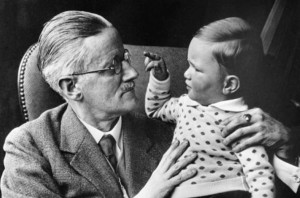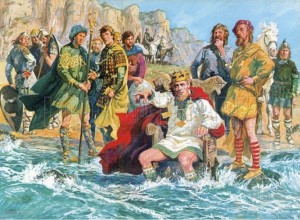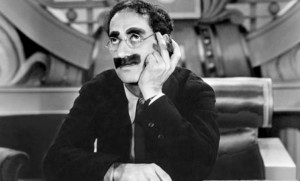Dear reader, once again we’re exceedingly proud to have another installment from that luminary of the near North, Mr Tony Emo. WE do however, apologise for the inconvenience and disappointment caused by the withdrawal of the other scheduled luminary from the north, the former P.M, Mr Tony Abbott. But we believe in the interests of jounalistic integrity and even handedness, this piece by Tony Emo is more balanced for our local audience. The former P.M we’ve been told, is still busy enlightening our friends in North America on the finer points of bigotry, exclusivity and small mindedness. They have a predeliction for ‘that ol style religion’ there. It’s in their DNA I’ve been told.
And now Mr Emo himself;
Just Incredible!
A Look at Factually-Uncontaminated Beliefs

Young Tony Emo. Dublin, (via Ballykissangel) c. 1943, being introduced to the finer points of religious doctrine by his grandfather, Adolphus Augustus Melancthon Emo.
As a young chap in Ireland, my head still firmly buried in the ample bosom of Mother Church, I heard a lot about the central importance of ‘faith’ in my life.
From the pulpit we heard again and again that the surest way to Express-Post your immortal soul to unending, celestial joy was to die for one’s faith. And, in chop-smacking detail, priests regaled us with sanguinary tales of stalwart believers who gladly suffered excruciating deaths rather than deny their holy faith. Immediately afterwards the school chapel fairly boomed to that stirring anthem, ‘Faith of Our Fathers’.

The real Henry the Eighth. Progenitor of “Heathen England”, carbuncles and all. Starring at the inaugural Royal variety performance. Eastcheap. c. 1540.
With this ever in mind, priests constantly warned us of the dangers of migrating to Heathen England, where fleshly temptations abounded and one’s faith would be under constant assault.
So little wonder that when I advised my parents that I was getting married to a Protestant girl (in reality, as much a pagan as I was), my devout mother’s first response was ‘And does that mean you will be giving up your faith?’. Everything else (would my sisters be bridesmaids, reception venue, invitation list, etc.) was subsidiary.
‘Faith’ – religious faith, that is – was a very big deal, indeed. It was the most important attribute one could have in this world, in value far beyond any fleeting, temporal distractions like wealth, fame or rank. It was what set you on course for the everlasting Beatific Vision or, if neglected or spurned, the unquenchable flames of Hellfire!
For all that, I did go to England, married the ‘Protestant’ girl, mingled freely with Anglo-Saxon heathens and, worst of all, fell into the company of libidinous Hibernian apostates, chief of whom is now (remarkably) the Poetry Editor of a widely respected on-line journal of ideas and culture!
Having lost my faith in the Church of Rome, I eagerly took up Groucho Marx’s approach to faithful constancy, ‘Why be faithful to one, when you can be faithful to them all!’.
More seriously, for some time now I have pondered on the ‘faith’ that religionists keep referring to as a special virtue and wondered whether it is really a different species to the notion of ‘credulity’.
In religion, at least, is the difference simply a matter of individual perspective? Can the unfounded belief in invisible beings you describe as faith, be seen by others as simple credulity? While a self-described ‘spiritual’ person, revelatory religion seems to me to be delusional and so I have no difficulty in thinking of its votaries as credulous.
Outside religion, we may interpret ‘faith’ as being a conviction constructed upon informal, fragmentary and partial knowledge or experience. (For example, an individual’s known character and record suggests that they are very likely to perform in a certain way in a future undertaking – and this justifies having ‘faith’ in their capacity.)
Credulity, on the other hand, could be regarded as being generally unanchored to objective facts and driven instead by wish-projection, susceptibility to persuasive flimflam, neurotic emotional need, lack of critical thinking, conditioning, unrealistic ‘straight-line’ projections, and so on.
Also, credulousness is a habit of mind: if you believe one piece of nonsense it is very likely you also believe in many other types of rubbish. So, we are not surprised that anti-vaxers also believe in crystal magic, numerology, alien visits and so on.
At the extreme, credulity morphs into magical thinking – and this is never more dangerous that when it is projected onto individuals. Cult leaders, like the odious L. Ron Hubbard, and despots like Adolf Hitler and the Pyongyang dynasty, are ascribed superhuman powers and are deemed to be guided by the sure hand of Providence. We know that when that happens, intelligent people can be persuaded to act stupidly, kindly folk to behave cruelly… and reality is suspended.

‘Questioning to the Un-questioners’ (op. cit. Donald Rumsfeld) in his capacity to turn the tide. Our favourite Saxon King. Canute. Originally referred to as CNUT. Our editor believes it’s Saxon spelling is an anagram of sorts. We’re confused and would offer a prize to any reader who could decipher the correct interperatation of this anagram in common English usage.
Finally, if you ask me at what point ‘faith’ elides into ‘credulity’, I would say I do not know with any certainty. But this much I do hold as an article of faith: our scientific knowledge of ourselves and our universe is only extended by unfettered questioning and curiosity, not by a self-satisfied and smug assumption that all the important answers we need are in a single, ancient book.
And I have never yet heard of doubters and questioners ever burning anyone at the stake or blowing themselves up in a classroom of innocents because others did not share their version of skepticism!

